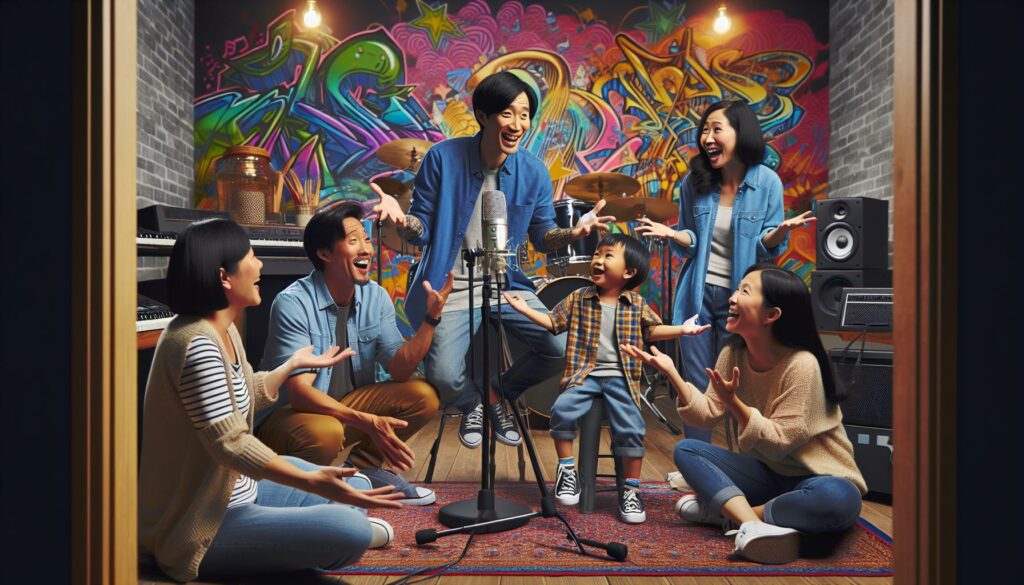Growing up with Asian parents often means navigating a unique blend of cultural expectations and humor. I can’t help but imagine what it would be like if they channeled their wisdom and quirks into a rap song. Picture the beats dropping while they spit bars about academic pressure and the importance of family honor.
This playful concept not only highlights the generational gap but also captures the love and tough love that shapes our lives. From those late-night study sessions to the classic “”What will people think?”” line, a rap song from Asian parents could be both hilarious and relatable. Let’s dive into this imaginative world where tradition meets modern rhythm, and explore the potential lyrics that could emerge from this fusion of cultures.
Key Takeaways
- Cultural Expectations: Asian parenting often involves high expectations and a strong focus on education, which could be reflected humorously in rap lyrics that highlight academic pressure.
- Authoritative Approach: Many Asian parents balance warmth with strictness, shaping an environment conducive to academic success while embedding family values in their children’s upbringing.
- Integration of Humor: The blending of serious themes with humor in rap can make cultural expectations more relatable, fostering a connection between traditional values and modern experiences.
- Creative Expression: Rap serves as a powerful medium for Asian parents to encapsulate their values and narratives, transforming family dynamics and expectations into engaging musical storytelling.
- Bridging Generational Gaps: Using contemporary music styles like rap allows for open conversations between parents and children, facilitating mutual understanding and empathy regarding cultural upbringing.
- Engaging Youth Culture: By incorporating elements that resonate with youth, such as modern slang and relatable scenarios, Asian parents can connect with younger generations and remain relevant in their lives.
If Asian Parents Made A Rap Song Lyrics
Asian parenting styles often emphasize high expectations, discipline, and respect for authority. Parents prioritize education, aiming for their children to achieve top grades and secure prestigious careers.
- Authoritative Approach: Many Asian parents adopt an authoritative style, combining warmth with strict rules. This balance fosters a supportive environment for academic success while establishing clear expectations.
- Protection and Guidance: Asian parents typically provide guidance and protection for their children. This approach includes making decisions about education, extracurricular activities, and friendships to ensure children pursue paths that align with family values.
- Cultural Emphasis on Honor: The concept of family honor is central in many Asian cultures. Parents often instill a sense of duty in their children, emphasizing the importance of upholding family reputation through achievements and conduct.
- Strong Work Ethic: Asian parents stress the value of hard work and perseverance. They encourage their children to engage in rigorous study routines and develop resilience in the face of challenges.
- Community Involvement: Participation in community and cultural events is another aspect of Asian parenting. Parents often involve their children in practices that reinforce cultural identity and belonging.
These parenting styles contribute to a unique blend of love and tough love, creating a complex dynamic that shapes the experience of many Asian children. The influence of these styles permeates various aspects of daily life, reflecting the integration of traditional values with contemporary society.
Cultural Influences on Music
Asian cultural influences significantly shape the themes and styles found in music, particularly in rap songs that capture family dynamics and societal expectations.
Traditional Values in Modern Context
Traditional values play a crucial role in shaping the content of rap songs that reflect Asian parenting experiences. Parents often instill principles like respect for elders, strong work ethics, and the importance of education. These values manifest in lyrics that address academic pressure and family honor. For instance, lines may highlight the need for high grades and the pursuit of careers in fields like medicine or engineering. Such themes resonate with listeners who understand the weight of familial expectations while blending them seamlessly into modern musical formats, creating a relatable narrative.
The Integration of Humor and Seriousness
Humor serves as an essential tool in making serious themes more accessible in rap lyrics. Many Asian parents combine love and discipline, often leading to situations ripe for comedic expression. Lines might depict exaggerated scenarios that humorously address common parental sayings or generational misunderstandings. This integration creates a balance between lightheartedness and the earnestness of cultural expectations. The humor invites listeners to reflect on their experiences while appreciating the complexity of their upbringing, enriching the overall message conveyed through the music.
Creative Expression Through Rap
Rap music serves as a dynamic platform for expressing complex family dynamics and cultural expectations. I envision Asian parents utilizing this genre to voice their values and experiences, blending humor with serious themes. The rhythmic flow of rap can encapsulate the pressure surrounding academic excellence, weaving in personal anecdotes that reflect the essence of upbringing.
Lyrics might tackle the intensity of parental expectations with lines about late-night study sessions and relentless mantra-like reminders. Phrases like “”study hard, don’t sleep, keep that GPA up,”” resonate with many who’ve felt the weight of familial honor. Rap can transform these pressures into a relatable narrative, bridging generational gaps while emphasizing unyielding love.
Cultural pride emerges in the wordplay and references, portraying the balancing act between tradition and modernity. Each verse may showcase the struggle to maintain respect for elders while adapting to contemporary society. Humor acts as a vital ingredient, softening the serious undertones, making relatable situations more digestible. Exaggerated expressions like “”You think you can slack off? Nah, that’s my tuition you’re wasting!”” highlight common misunderstandings with a playful twist.
Community values also find their way into the lyrics, emphasizing the notion of collectivism. Themes surrounding family gatherings and obligations, alongside the importance of supporting one another through challenges, enrich the storytelling aspect. Rap evolves into a medium where the past meets the present, reminding listeners of their roots while engaging them in a musical discussion.
The incorporation of traditional elements—like proverbs or storytelling techniques—into rap lyrics adds depth to this creative expression. By using this format, Asian parents can communicate timeless wisdom, turning everyday lessons into catchy hooks. The fusion of rap with cultural context not only entertains but also educates, ensuring the next generation appreciates their heritage.
Analyzing the Lyrics
The imagined lyrics of an Asian parents’ rap song encapsulate complex cultural themes and unique expressions. Each line serves as a commentary on expectations, honoring family values, and navigating generational differences.
Thematic Elements
Common themes in these lyrics include academic pressure, family honor, and love wrapped in tough love. Academic pressure often surfaces through phrases that underscore the importance of grades, creating a relatable hook for listeners. Family honor becomes a recurring motif, reflecting the responsibility children feel to uphold their family’s reputation. Love, expressed through tough love, highlights the unyielding support that drives children to succeed. In each verse, I can see how these elements intertwine, addressing the emotional weight of parental expectations while celebrating cultural identity.
Unique Phrasing and Language Use
Creative phrasing enhances the impact of the lyrics. Lines may utilize traditional sayings or catchphrases that resonate within Asian communities. I notice how playful rhymes introduce humor, making serious messages more relatable. This blend of modern rap vernacular with traditional expressions not only showcases language skills but also creates an engaging connection with the audience. Personal anecdotes woven into the lyrics add authenticity, allowing listeners to see reflections of their upbringing and shared experiences. By incorporating unique language and phrasing, the song bridges generations, emphasizing the evolving dialogue between past and present.
Impact on Audience Reception
The potential reception of a rap song created by Asian parents reflects a unique cultural dynamic. The blend of humor and serious themes resonates deeply, fostering connections across generations.
Bridging Generational Gaps
Bridging generational gaps becomes essential in this context. The fusion of rap with traditional themes allows for conversations between parents and children. Lyrics that address familiar pressures, such as academic success, create common ground, facilitating understanding. Humor, often prevalent in the lyrics, encourages open discussions about the nuances of upbringing. This engagement provides a platform where respectful dialogue flourishes, supporting mutual respect and empathy across different viewpoints.
Engaging Youth Culture
Engaging youth culture plays a pivotal role in the intended reception. By utilizing the popular medium of rap, Asian parents connect with younger audiences in ways that traditional methods may not. The rhythmic nature of rap invites listeners to embrace the messages while enjoying the artistry. Lyrics incorporating contemporary slang or references to modern experiences capture attention and enhance relatability. This approach not only makes the content accessible but also shows an appreciation for current trends, allowing Chinese parents to remain relevant in their children’s lives. Through this cultural engagement, the generational divide narrows, fostering a deeper understanding of shared values and experiences.
Imagining Asian parents creating a rap song brings a unique blend of humor and heartfelt wisdom to light. It’s fascinating to see how traditional values can mesh with modern music to create relatable content that resonates across generations. The themes of academic pressure and family honor are not just serious topics but also moments that can be shared and laughed about.
This playful exploration highlights the importance of bridging generational gaps. By using rap as a medium, parents can communicate their values in a way that feels fresh and engaging. Ultimately, it’s about fostering understanding and appreciation for our shared experiences while celebrating our cultural heritage.



